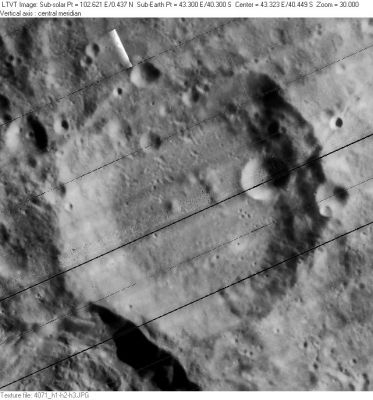Metius
Contents
Metius
| Lat: 40.3°S, Long: 43.3°E, Diam: 87 km, Depth: 4.12 km, Rükl: 68, Nectarian |
LO-IV-071H The 14-km crater at the foot of the eastern wall is Metius B. 8-km Metius F (on the rim by the white streak at 11 o-clock) and 9-km Metius G (on the rim at 3 o’clock) are also named, as is 6-km Metius E (at the foot of the north wall, directly below Metius F).
Images
LPOD Photo Gallery Lunar Orbiter Images
Maps
(LAC zone 114D2) LAC map Geologic map
Description
Description: Elger
(IAU Directions) METIUS.--This ring-plain, of about the same size as Fabricius, but with a still loftier barrier, abuts on the N. wall of this formation, and has caused a very obvious deformation in its contour. It is prominently terraced internally, and on the E. the wall rises at one peak to a height of 13,000 feet above the floor, which contains a deep crater on the E. of the centre, and many ridges.
Description: Wikipedia
Additional Information
Depth data from Kurt Fisher database
- Westfall, 2000: 4.12 km
- Viscardy, 1985: 3 km
- Cherrington, 1969: 5.66 km
Stairway
- There's a curious Trompe l'oeil effect on the system of hillocks at the floor of Metius, which looks like some sort of small stairway when it is observed through telescope. See LPOD Young and Old, which shows the stairway effect very well. - DannyCaes Feb 13, 2016
Nomenclature
- Metius (Adriaan Adriaanszoon) (December 9, 1571 - September 6, 1635) was a Dutch mathematician and astronomer. Metius published treatises on the astrolabe and on surveying, manufactured astronomical instruments, and developed a special form of Jacob's staff. In Vermeer's painting The Astronomer (1668), the book lying on the table has been indentified as a 1621 second edition of Metius's Institutiones Astronomicae Geographicae. It is open to Book III, where "inspiration from God" is recommended for astronomical research along with knowledge of geometry and the aid of mechanical instruments.
- Riccioli called this crater Mulerius.
LPOD Articles
Blacky and Wispy
Crateric Concatenation
Young and Old (the Metius and Fabricius pair)
Bibliography
